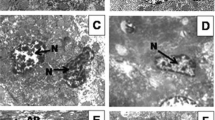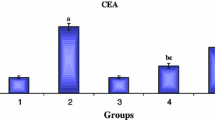Abstract
This study was carried out to investigate the anti-carcinogenic effect of l-carnosine in human carcinoma cells (SNU-423). The SNU-423 cancer cells were cultured at a density of 2 × 104 cells/well in Dulbecco modified Eagle medium. After 24 h of adherence, the cells were treated with l-carnosine (0.2 and 1 mg/mL) for 48 h. Then, cell viability was assessed by sulforhodamine assay, while mitochondrial dysfunction was measured by fluorescence microscopy using chromatin-specific dye Hoechst 33258. Intracellular levels of ROS were assayed by fluorescence spectroscopy with 2′,7′-dichlorofluorescein diacetate (DCFDA). l-Carnosine significantly inhibited the growth of the SNU-423 cells (p < 0.05). The inhibitory effect of l-carnosine was confirmed by results from mitochondrial fragmentation assay. The relative fluorescent unit was increased in a dose-dependent manner by l-carnosine, with values of 79.43, 186.87 and 400.89 for 0.6, 0.8 and 1 mg/mL of l-carnosine, respectively (p < 0.05). These results demonstrate that l-carnosine exerts anti-carcinogenic effects in human liver cancer cells.




Similar content being viewed by others
References
Bonner C, Bacon S, Concannon CG, Rizvi SR, Baquié M, Farrelly AM, Kilbride SM, Dussmann H, Ward MW, Boulanger CM, Wollheim CB, Graf R, Byrne MM, Prehn JH (2010) INS-1 cells undergoing caspase-dependent apoptosis enhance the regenerative capacity of neighboring cells. Diabetes 59:2799–2808
Chez MG, Buchanan CP, Aimonovitch MC, Becker M, Schaefer K, Black C, Komen J (2012) Double-blind, placebo-controlled study of l-carnosine supplementation in children with autistic spectrum disorders. J Child Neurol 17:833–837
Darzynkiewicz Z, Juan G, Li X, Gorczyca W, Murakami T, Traganos F (1997) Cytometry in cell necrobiology: analysis of apoptosis and accidental cell death (necrosis). Cytometry 27:1–20
Dickinson BC, Chang CJ (2012) Responses. Nat Chem Biol 7:504–511
Fontana M, Pinnen F, Lucente G, Pecci L (2002) Prevention of peroxynitrite-dependent damage by carnosine and related sulphonamido pseudodipeptides. Cell Mol Life Sci 59:546–551
Gallant S, Semyonova M, Yuneva M (2000) Carnosine as a potential anti-senescence drug. Biochemistry (Mosc) 65:866–868
Hipkiss AR, Worthington VC, Himsworth DT, Herwig W (1998) Protective effects of carnosine against protein modification mediated by malondialdehyde and hypochlorite. Biochim Biophys Acta 1380:46–54
Iovine B, Iannella ML, Nocella F, Pricolo MR, Bevilacqua MA (2012) Carnosine inhibits KRAS-mediated HCT116 proliferation by affecting ATP and ROS production. Cancer Lett 315:122–128
Kohen R, Yamamoto Y, Cundy KC, Ames BN (1988) Antioxidant activity of carnosine, homo carnosine, and anserine present in muscle and brain. Proc Natl Acad Sci USA 85:3175–3179
Muthuraman P, Ramkumar K, Kim DH (2014) Analysis of the dose-dependent effect of zinc oxide nanoparticles on the oxidative stress and antioxidant enzyme activity in adipocytes. Appl Biochem Biotechnol 174:2851–2863
Muthuraman P, Gansukh E, Baskar V, Bhupendra M, Rafi N, Bong Y, Kim DH (2015) Time and concentration dependent therapeutic potential of silver nanoparticles in cervical carcinoma cells. Biol Trace Elem Res 170:309–319
Muthuraman P, Enkhtaivan G, Young JA, Hoon HJ, Lee H, Lee S, Kim DH (2016a) In vitro therapeutic potential of Tio2 nanoparticles against human cervical carcinoma cells. Biol Trace Elem Res 171:293–300
Muthuraman P, Enkhtaivan G, Bhupendra M, Chandrasekaran M, Rafi N, Kim DH (2016b) Investigation of the role of aspartame on apoptosis process in Hela cells. Saudi J Biol Sci 23:503–506
Muthuraman P, Gansukh E, Kim DH (2016c) Therapeutic efficacy of natural dipeptide carnosine against human cervical carcinoma cells. J Mol Recognit 29:426–435
Ramsey MR, Sharpless NE (2006) ROS as a tumor suppressor? Nat Cell Biol 8:1213–1215
Reed JC (2007) Apoptosis-regulating proteins as targets for drug discovery. Trends Mol Med 7:314–319
Renner C, Seyffarth A, Garcia de Arriba S, Meixensberger J, Gebhardt R, Gaunitz F (2008) Carnosine inhibits growth of cells isolated from human glioblastoma multiforme. Int J Pept Res Ther 2:127–135
Renner C, Asperger A, Seyffarth A, Meixensberger J, Gebhardt R (2012) Carnosine inhibits ATP production in cells from malignant glioma. Neurol Res 32:101–105
Schulz M, Hamprecht B, Kleinkauf H, Bauer K (1987) Peptide uptake by astroglia-rich brain cultures. J Neurochem 49:748–755
Author information
Authors and Affiliations
Corresponding author
Ethics declarations
Conflict of interest
All authors declare that they have no conflict of interest.
Human participants and animals participants
Research involving Human Participants and/or Animals: This article does not contain any studies with human participants or animals performed by any of the authors.
Additional information
Minghui Ding and Guihua Jiao have contributed equally.
Rights and permissions
About this article
Cite this article
Ding, M., Jiao, G., Shi, H. et al. Investigations on in vitro anti-carcinogenic potential of l-carnosine in liver cancer cells. Cytotechnology 70, 163–167 (2018). https://doi.org/10.1007/s10616-017-0123-2
Received:
Accepted:
Published:
Issue Date:
DOI: https://doi.org/10.1007/s10616-017-0123-2




